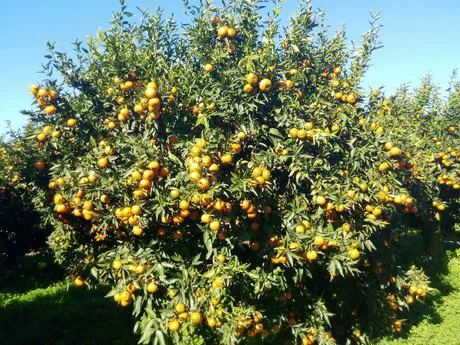When it comes to Italian clementines, "production peaked last year, while the level will be minimal this year," reports citrus science specialist, Francesco Perri (in the photo).
Volumes were abundant last year, though fruits had small grades. This year, it's the opposite and "some producers will only manage to obtain a few tons per hectare. With these yields, it's not even worth harvesting."
"Inspections in the main production areas in southern Italy, i.e. Calabria, Puglia and Basilicata, revealed there will be 70-80% fewer clementines. The drop will affect all varieties between late September and February."
Other issues
There are indeed companies that have managed to deal with the situation. "Nature is what defines the rules of the game every year. Being well-organized is the only way to survive."
In addition to clementines, other citrus fruit will also be affected by a drop in production. A 30% drop is expected for Navel or Tarocco oranges, for example. However, fewer fruits on trees should mean larger grades.
 A tree laden with clementines during the past campaign
A tree laden with clementines during the past campaign
A drop in volumes is also expected for other fruits such as table grapes, kiwifruit, pears and apples. "However clementines will be the worst off. We have already talked to retail chain buyers about it. The alternative will unfortunately be Spain, also because whatever quantities are available were damaged by hail."
"The Sibari plain is doing a little better, while the produce is lacking in the Rosarno plain and the main production areas in Puglia. Only a few will manage to save themselves and only because, over the years, they have carried out great technical work."
The expert stresses that, while there have always been highs and lows in agriculture, producers need to be able to tackle the situation in the right way. "My father, who is 90, is not surprised by years like these. Of course, especially in moments of crisis, one needs to change mentality otherwise the risk is to become hopeless."
"In Italy, and especially in the south, there is great biodiversity when it comes to citrus fruit. We should take advantage of it, while I fear operators are unprepared to tackle emergencies in the short period and challenges in the medium/long period."
Research and innovation are unknown to most
"Very few believe and invest in innovation despite the wealth of options we have available. For example, the CREA-OFA research center in Acireale boasts a collection of germplasms envied by the whole world. A couple of years ago, the center initiated a technological transfer program to push POs to experiment new varieties providing the chance to take advantage of the most interesting ones, however only three companies have adhered so far!"
"In Spain, large groups that are actually competitors work together to set up private research centers that have already obtained a few interesting cultivars. Now they are aiming at developing cultivars with a shelf-life suitable to reach faraway destinations such as China, Canada or the US."
Genetic improvement in citrus cultivation has vast implications - Click here to enlarge
"Production management is a serious and tremendously complicated thing that includes a whole series of factors (information, knowledge, method, organizations, relationships with institutional bodies, relationships with the territory, collaboration and sharing) that must not be underestimated. Producers need to invest not only in R&D but also in the training of technicians that can help companies when it comes to their production and commercial strategies. However, it emerges that companies are reluctant to take part in any change or innovation process."
"Yields are expected to drop in Spain as well by around 50% when it comes to early clementines and 20-30% for medium-late clementines, but this could actually favor grades. In the 1970s, Italy used to be a leader in the Mediterranean when it came to production and exports. We should start asking ourselves what we did wrong."
Contacts:
Francesco Perri, agronomist
Cell.: (+39) 338 4164800
Email: f.scoperri@libero.it
